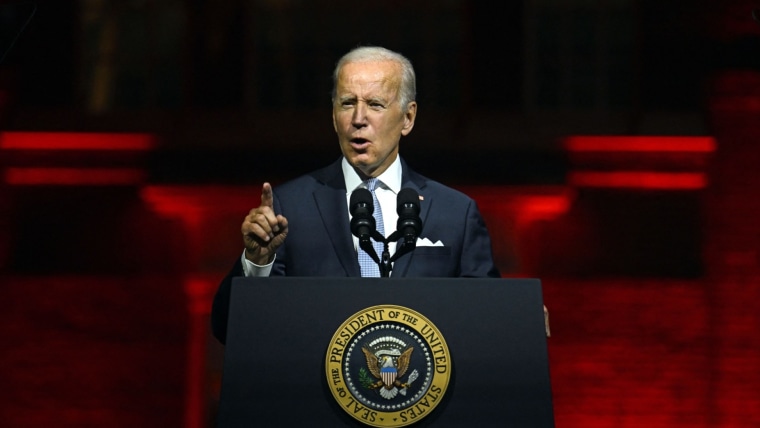When President Joe Biden delivered remarks last week on the domestic dangers our democracy is facing, he specifically called out the Republican Party’s radicalized wing that “promotes authoritarian leaders.”
A week later, his immediate predecessor helped prove the Democrat right. By way of his Twitter-like platform, Donald Trump published this missive yesterday.
“President Jair Bolsonaro of Brazil, ‘Tropical Trump’ as he is affectionately called, has done a GREAT job for the wonderful people of Brazil. When I was President of the U.S., there was no other country leader who called me more than Jair seeking Tariff & Tax cuts, Trade Renegotiations, Strengthened Drug & Border Policies (to put the ‘bad guys’ in jail!), Military Help, & more. President Bolsonaro loves Brazil beyond all else. He is a wonderful man, and has my Complete & Total Endorsement!!!”
At face value, it’s not scandalous that the former American president has taken an interest in foreign elections and endorsed foreign leaders’ re-election campaigns. As we’ve discussed, other former U.S. presidents have done the same thing: Barack Obama, for example, carefully endorsed France’s Emmanuel Macron in 2017. Two years later, the Democrat voiced similar support for Canada’s Justin Trudeau.
What makes Trump’s international focus notable, however, is his routine support for foreign autocrats who keep undermining their own democracies.
Circling back to our earlier coverage, it was in 2020, for example, when Trump endorsed Polish President Andrzej Duda — four days before Election Day in Poland — despite the restrictions Duda had imposed on his country’s judiciary, media and civil society.
Trump specifically praised Duda’s “vigilant efforts to uphold the rule of law,” even as Poland faced fierce pushback from the European Commission over officials’ view that Duda was backsliding on adhering to the rule of law.
He wasn’t alone. The New York Times’ Jamelle Bouie explained a while back that Prime Minister Viktor Orban’s Hungary “is corrupt, repressive and authoritarian, a place where democracy is little more than window dressing.” Vox published a related report in 2018 on “how democracy died in Hungary.” It noted a vote from the European Parliament, which labeled Orban’s government a “systemic threat to the rule of law.”
Trump has nevertheless become one of Orban’s biggest international fans and has extended Orban enthusiastic endorsements.
And then, of course, there’s Brazil, where polls suggest Bolsonaro is likely to lose — and where the autocratic leader has spent recent months questioning the legitimacy of his country’s electoral system, as part of a political strategy to dismiss his likely defeat as “rigged.” The country’s far-right president has already declared that he will not accept election results that he does not like.
Yes, as a matter of fact, this does sound familiar.
Columbia University’s Miguel Lago explained in a New York Times opinion piece this week, “To some, this looks like the groundwork for a coup. In this view, Mr. Bolsonaro intends to refuse any election result that does not please him and, with the help of the military, install himself as president permanently. The reading is half right: Mr. Bolsonaro doesn’t intend to leave office, regardless of the election results. But it’s not a coup, with its need for elite consensus and eschewal of mass mobilization, he’s after. It’s a revolution.”
For some in the United States, this is cause for serious alarm. Independent Sen. Bernie Sanders of Vermont, for example, recently told The Washington Post’s Greg Sargent and Paul Waldman about a draft proposal, focused specifically on Brazil, that would declare the United States’ intention to immediately recognize the election outcome that international monitors deem free and fair.
Just as important, Sanders’ measure would warn that future U.S. aid would be in jeopardy for foreign governments that claim power through undemocratic means.
It’s against this backdrop that Trump, once again showing his disdain for his own country’s democratic principles, thought it’d be a good idea to endorse the “Tropical Trump” and celebrate the Brazilian autocrat.
You don’t need a doctorate in political science to recognize the common thread tying together the Republican’s international endorsements: Trump likes authoritarians who chip away at their democracies.
Yes, other former American presidents have expressed support for foreign candidates and officeholders, but there has never been any doubts about leaders such as Macron and Trudeau supporting democracy. Each of Trump’s international endorsements tell a different kind of story.
When Biden condemned Republicans who “promote authoritarian leaders,” it was not an abstract criticism.

